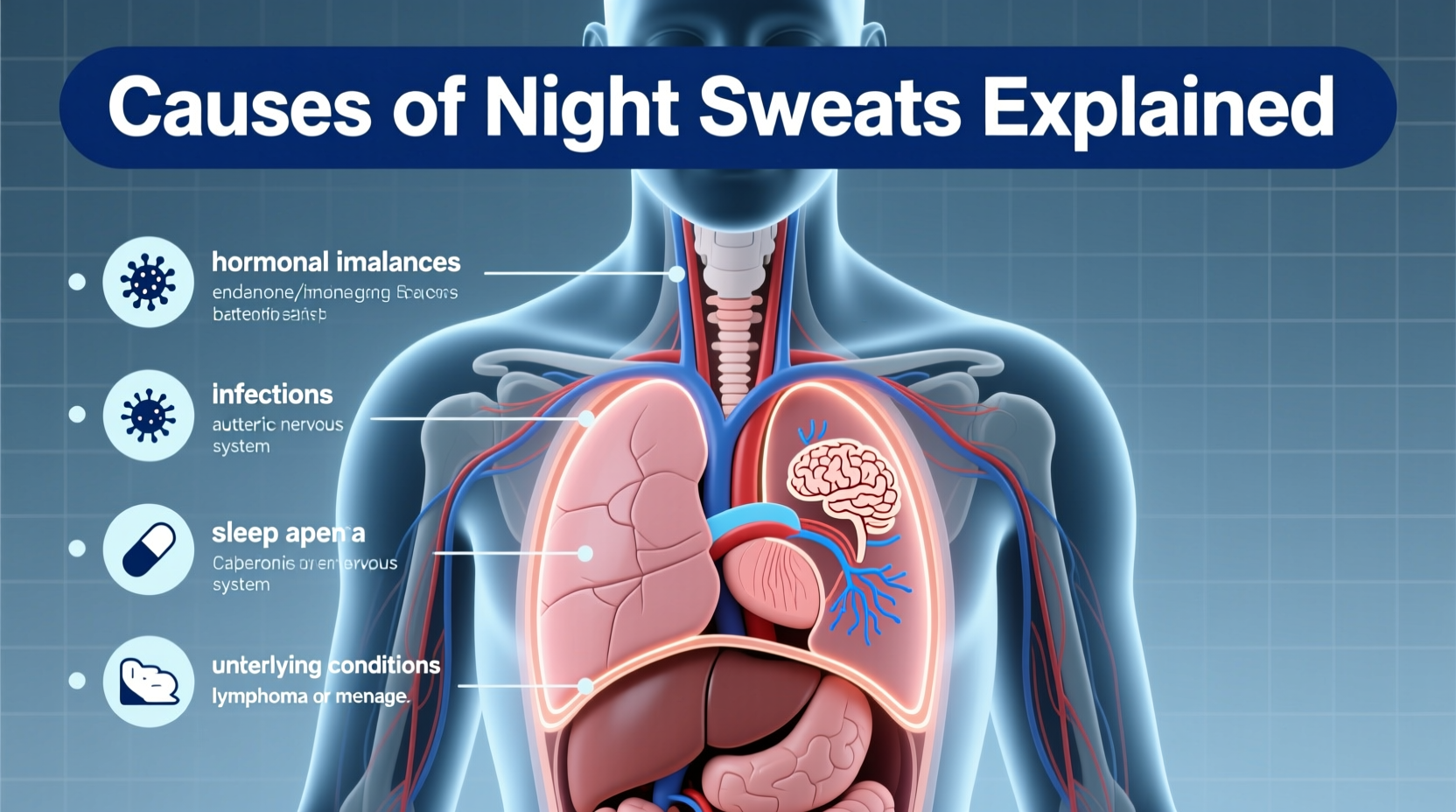Night sweats are more than just an inconvenience—they can disrupt sleep, damage bedding, and signal underlying health issues. While occasional sweating during sleep may result from a warm room or heavy blankets, recurrent, drenching night sweats often point to deeper physiological or medical causes. Understanding why you sweat at night is the first step toward addressing the root issue and restoring restful sleep.
What Are Night Sweats?

Night sweats differ from mild perspiration due to heat. They involve excessive, often soaking sweating that occurs repeatedly during sleep, regardless of room temperature. People experiencing true night sweats may wake up with damp pajamas and wet sheets, even in cool environments.
This condition affects people of all ages and genders, though prevalence increases with age and certain health conditions. According to the Mayo Clinic, \"Night sweats can be a sign of infection, hormonal changes, or side effects from medication.\"
“True night sweats are not caused by external heat—they originate internally and should never be ignored if persistent.” — Dr. Lena Patel, Internal Medicine Specialist
Common Medical Causes of Night Sweats
While environmental factors play a role, recurring night sweats frequently stem from internal health conditions. Below are some of the most common medical explanations:
- Infections: Tuberculosis, HIV, endocarditis, and other bacterial or viral infections often present night sweats as an early symptom.
- Hormonal Imbalances: Menopause, hyperthyroidism, and low testosterone levels can trigger thermoregulatory dysfunction.
- Cancers: Lymphoma and leukemia are known to cause drenching night sweats, often accompanied by unexplained weight loss and fatigue.
- Mental Health Conditions: Anxiety disorders and PTSD may lead to nocturnal sweating due to heightened nervous system activity.
- Medications: Antidepressants (especially SSRIs), diabetes drugs, and hormone therapies are frequent culprits.
Non-Medical Triggers You Might Be Overlooking
Not all night sweats require a trip to the doctor. Several lifestyle and environmental factors contribute significantly:
| Factor | How It Causes Sweating | Solution |
|---|---|---|
| Poor Bedroom Ventilation | Traps body heat and humidity | Use fans or open windows; consider air conditioning |
| Synthetic Bedding or Pajamas | Blocks moisture evaporation | Switch to cotton, bamboo, or moisture-wicking fabrics |
| Eating Spicy Food Before Bed | Raises core body temperature | Avoid heavy meals 2–3 hours before sleep |
| Alcohol Consumption | Dilates blood vessels and disrupts thermoregulation | Limit alcohol intake, especially at night |
| Overheated Room | Exceeds ideal sleeping temperature (60–67°F) | Use a thermostat or smart AC to maintain coolness |
Real-Life Example: Maria’s Experience
Maria, a 48-year-old teacher, began waking up soaked three times a week. She assumed it was stress until she tracked her habits. Her journal revealed a pattern: nights after drinking wine and eating curry, sweating worsened. After eliminating evening alcohol and switching to breathable linen sheets, her symptoms dropped by 80%. A follow-up with her doctor ruled out menopause-related causes, confirming lifestyle triggers were dominant.
When to See a Doctor
Occasional sweating isn’t alarming. But if you experience any of the following, consult a healthcare provider promptly:
- Sweating so severe it requires changing clothes or sheets
- Night sweats lasting more than two weeks without explanation
- Accompanying symptoms: fever, chills, unexplained weight loss, fatigue
- New onset after starting a medication
Diagnostic steps typically include blood tests (CBC, thyroid panel, glucose), imaging if cancer is suspected, and review of current medications. Early detection of conditions like lymphoma or tuberculosis improves outcomes significantly.
Step-by-Step: How to Evaluate Your Night Sweats
- Monitor Patterns: Record frequency, intensity, and associated behaviors (food, drink, stress).
- Adjust Environment: Lower room temperature, switch to natural fiber bedding, and remove extra blankets.
- Review Medications: Check side effects of prescriptions with your pharmacist or doctor.
- Eliminate Lifestyle Triggers: Cut out late-night alcohol, spicy foods, and caffeine.
- Consult a Physician: If no improvement in 14 days, schedule a medical evaluation.
Prevention and Management Checklist
Use this actionable checklist to reduce or eliminate night sweats:
- ✅ Set bedroom temperature between 60–67°F (15–19°C)
- ✅ Use moisture-wicking pajamas and breathable bedding
- ✅ Avoid alcohol and spicy foods within 3 hours of bedtime
- ✅ Establish a consistent sleep schedule
- ✅ Stay hydrated during the day to support thermoregulation
- ✅ Practice relaxation techniques like deep breathing or meditation to reduce anxiety-induced sweating
- ✅ Review all medications with your doctor annually
Frequently Asked Questions
Are night sweats a sign of diabetes?
Yes, in some cases. Nocturnal hypoglycemia (low blood sugar) in people with type 1 or type 2 diabetes can trigger sweating, along with nightmares, confusion, or heart palpitations upon waking. If you have diabetes and experience night sweats, check your glucose levels before bed and consult your endocrinologist.
Can anxiety cause night sweats?
Absolutely. Chronic stress and anxiety disorders activate the sympathetic nervous system, increasing sweat production. Nighttime panic attacks or subconscious worry cycles can manifest physically as sweating. Cognitive behavioral therapy (CBT) and mindfulness practices often help reduce episodes.
Do men experience night sweats too?
Yes. While commonly associated with menopause, men also suffer from night sweats—often due to low testosterone, sleep apnea, infections, or medication side effects. Andropause (male menopause) can produce similar symptoms to female menopause, including hot flashes and sweating.
Conclusion: Take Control of Your Sleep Health
Night sweats are not something you must simply endure. Whether driven by environment, lifestyle, or medical conditions, effective solutions exist. Start by making simple adjustments to your sleep environment and habits. Track your symptoms diligently and don’t hesitate to seek professional guidance when needed. Addressing the root cause—not just the symptom—leads to lasting relief and better overall health.









 浙公网安备
33010002000092号
浙公网安备
33010002000092号 浙B2-20120091-4
浙B2-20120091-4
Comments
No comments yet. Why don't you start the discussion?